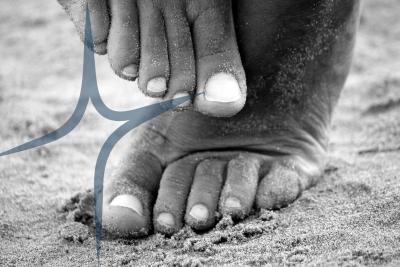
The average person takes 4,000 to 6,000 steps a day. That adds up to over 100,000 miles (the circumference of the Earth 4 times) over the course of a lifetime. With all that walking, it’s important for us to be thinking about the health of our feet as much as possible.
“Your feet are important. They’re the basis of your mobility,” said Dr. Angel Cuesta of the SIMEDHealth Foot and Ankle Center.
Approximately 3 out of 4 Americans will experience serious foot problems. If you have trouble remaining at a healthy weight or your work or daily activities require you to stand for most of the day, you are more at risk for:
- Adult acquired flat foot
- Stiff big toe
- Plantar Fasciitis
- Bunions
- Hammer toe
- Morton’s neuroma (inflamed nerves between the toes)
- Other arthritic-related foot and ankle conditions
However, if you are diabetic or pre-diabetic you are at risk for a more severe condition called neuropathy (commonly referred to as “diabetic foot”). This is when there is a decrease or lack of sensation in the feet.
When this condition occurs, you may have a more severe condition and not be able to feel it. In fact, 56,000 people a year lose their feet or legs due to diabetic foot. Because of this, Dr. Cuesta recommends that all diabetics have their feet and ankles checked by a podiatrist annually.
Other areas of the body may be affected by foot and ankle problems as well.
“Any foot or ankle problem can affect your knees, hips, back, and neck just in the way you walk. That pain can affect your blood pressure, stress levels, and emotional wellbeing. If you’re in pain while you’re walking, you’re going to be irritable, which in turn can affect your heart,” Dr. Cuesta said.
He recalls a time when a patient with high blood pressure came in for a foot procedure. Once the patient recovered and their pain had subsided, their blood pressure had returned to a normal level as well.
It’s important to take care of our feet before health problems escalate. So here are a few preventative care tips from Dr. Cuesta:
Stretching:
As we age, we lose our flexibility. You should be stretching out the Achilles tendon and legs as often as possible.
Maintaining a Healthy Weight:
According to Dr. Cuesta, it’s all about your diet. Being overweight puts more stress on your heart, lungs, and joints. If you are having trouble maintaining a healthy weight, talk your primary care physician today to find the right solution for your body.
Wearing the Proper Shoes:
Make sure to wear shoes with the proper width, a good amount of shock absorption and limit the use of heels, if possible. Dr. Cuesta says sneakers are the best shoes for healthy feet.
If you’re currently experiencing foot or ankle pain you should speak with a podiatrist (link) as soon as possible. Any foot or ankle pain that lasts more than a week is worth talking to your doctor about, said Dr. Cuesta.
Most importantly he says, “The day that you can’t stay active or walk a reasonable amount it can shave years off of your life.”
Click here to learn more about Dr. Cuesta and request an appointment at the SIMEHealth Foot and Ankle Center.